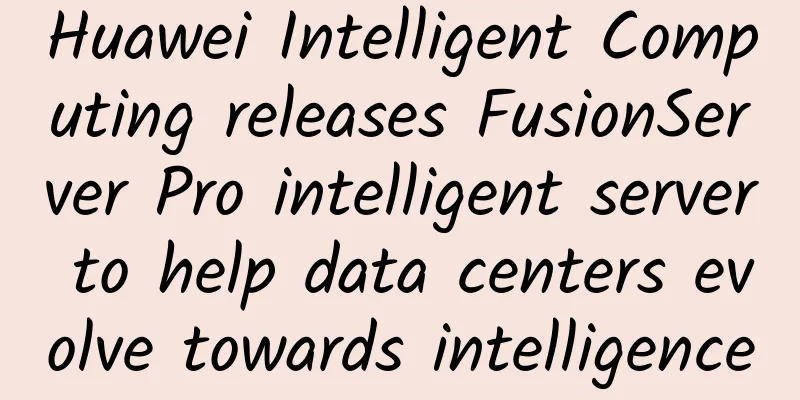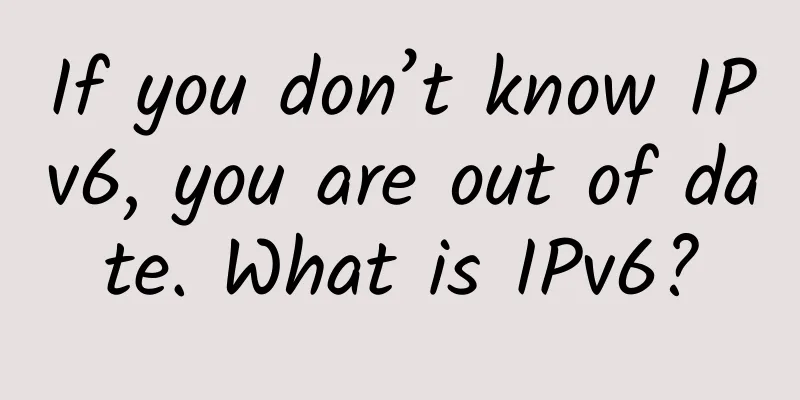Huawei Intelligent Computing releases FusionServer Pro intelligent server to help data centers evolve towards intelligence

|
[51CTO.com original article] Recently, Huawei's Intelligent Computing Business Department, which was established just four months ago, held a press conference in Beijing with the theme of "+ Intelligence, Computing Evolution", and officially released the FusionServer Pro intelligent server. Huawei's industry partners and customers such as Intel, Microsoft, SAP, and Forrester were also invited to attend, and together with Huawei's Intelligent Computing Business Department, witnessed the historical moment of breaking through the boundaries of computing power and opening a new era of intelligent servers. During the meeting, Ma Haixu, President of Huawei Intelligent Technology Business Unit, Zheng Dianhai, President of Huawei Intelligent Computing Global Marketing Sales and Service Department, and Zhang Xiaohua, President of Huawei Intelligent Computing Business Unit FusionServer Field, accepted interviews from the media and shared the R&D ideas and strategic planning behind the launch of FusionServer Pro intelligent servers. Huawei FusionServer Pro intelligent server launch site Ma Haixu told reporters that there were two main reasons for establishing the Intelligent Computing Business Department. First, the scope of intelligent computing has expanded, not only servers, but also computing from data centers to edge computing, and then to future in-vehicle computing. Second, there are more and more full AI application scenarios. On the edge side, from board modules, edge computing to data center servers, the full scenario has changed. "In the computing field, more efficient and short-chain operations are now needed. The Intelligent Computing Business Department is not only a research and development organization, but also includes front-end sales services, research and development teams, and end-to-end business units, which are conducive to more rapid and flexible resource concentration, better customer service, and response to market changes and needs." Then, Zhang Xiaohua explained the views of Huawei's Intelligent Computing Business Department on artificial intelligence. According to him, Huawei's public cloud and some large customers' self-built data centers have reached the level of intelligent data centers. However, most traditional data centers on the market cannot reach the level of intelligent data centers due to factors such as infrastructure and operation and maintenance capabilities. He said that as long as customers are willing to upgrade to intelligence, they can deploy it in different granularity and characteristics. He gave an example, saying that Atlas300 has no threshold for using existing servers in the data center, and is plug-and-play; adding FusionDirector software to traditional data centers, or loading Huawei intelligent components in newly purchased servers, can also enjoy the convenience and benefits brought by AI-enabled applications without changing existing equipment. "In the field of data centers, the purpose of artificial intelligence applications is to release more work tasks from traditional manual operations and complex human actions, and replace them with machines and software. In other words, in all aspects of future data center operation, maintenance, execution and deployment, the role of people will become weaker and weaker, and their proportion will become smaller and smaller." When asked about the positioning of the new products, Zheng Dianhai preferred to use the word "evolution" to describe these FusionServer Pro intelligent servers. "Intelligent servers are not replacements for traditional servers, but evolution. In the past few decades, although the scale of data center construction has been large, the degree of intelligence is not high. From deployment and application to operation and maintenance management, there is still a lot of room for improvement." He also talked about the deeper meaning. Huawei has not stopped at server intelligence, but has emphasized how to use intelligent means to release greater potential of data centers in customers' data centers. "Huawei's intelligent servers have released the potential of chips. Next, Huawei is considering how to vertically integrate L1, L2, and L3 to lower the TC throughout the entire life cycle, minimize human intervention in the operation and maintenance process, and reduce cost investment through more automated means. Huawei is working hard in this direction." Ma Haixu added that it was precisely because of the new trend of intelligent data center upgrades that Huawei deeply explored the pain points of customer applications and operations, and carried out research and development at the three levels of "intelligent acceleration, intelligent management, and intelligent data center", upgrading traditional servers to intelligent servers. It also provides comprehensive intelligent solutions for single-machine scenarios, cluster scenarios, and ultra-large-scale deployment scenarios, forming a "point-line-surface" three-in-one intelligent data center. [51CTO original article, please indicate the original author and source as 51CTO.com when reprinting on partner sites] |
<<: The SD-WAN track has changed. When will the dragon trainer appear?
>>: Wi-Fi signal is not good? Hybrid network architecture is a recommended choice
Recommend
With the advent of 5G, will edge data centers become popular?
The epidemic has interrupted the construction pro...
How to increase the speed of the router
[[183829]] How to increase the speed of the route...
KVMLA Japan/Singapore dedicated server monthly payment 30% off, 595 yuan/month E3-1230v3, 16G memory, 480G SSD, 20M bandwidth
KVMLA has launched a special promotion for dedica...
Networks, users and terminals have all taken shape, and accelerating 5G "network migration" has become a top priority for operators
It is now late October 2020. In a few days, my co...
China Mobile may withdraw all 3G networks by 2020, but terminals still need to support GSM
At the Global Terminal Summit held recently, Chin...
Phicomm N1 (Tiantian Chain) flash YYF voice version
More than 2 years ago, I recorded the process of ...
How does CDN work? Do you know?
A content delivery network (CDN) is a set of serv...
Japanese media: China may be the first to master 5G international standards
China, which has no say in almost all modern scie...
Can video ringtones become a phenomenal application in the 5G era?
The latest data: The number of video ringtone use...
Operating system: Introduction to SSH protocol knowledge
Today I will share with you the knowledge related...
Ruijie Networks launches Cloud Office 4.0 solution as an alternative to commercial PCs
On June 12, Ruijie Networks held a media conferen...
BandwagonHost releases Double 11 discount code, 10% discount on all VPS for life, starting from $44.49 per year
BandwagonHost has also released a Double 11 disco...
AkkoCloud: San Jose/Germany/UK CN2 GIA, starting at 299 yuan per year, 300-600M bandwidth
AkkoCloud is a Chinese VPS hosting company founde...
Practical analysis of network log correlation on OSSIM platform
This article mainly conducts an in-depth analysis...
China Unicom 4G is about to explode! Full-network and full-band LTE is approved by the Ministry of Industry and Information Technology
The Ministry of Industry and Information Technolo...









